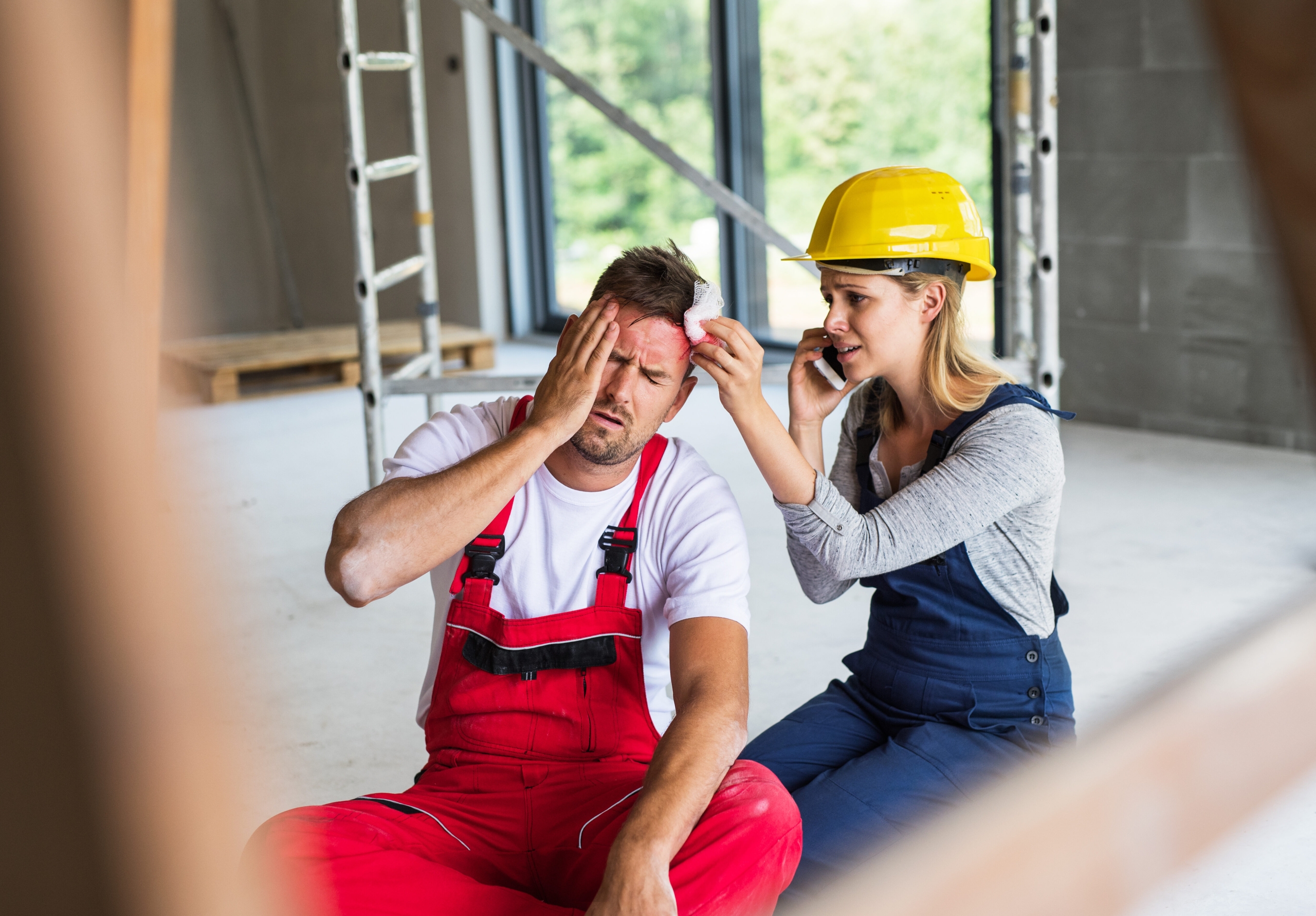Emergency Room for Concussion Treatment
Concussions are not normally life-threatening injuries, but they’re still very serious. A concussion that causes loss of consciousness requires immediate medical attention, because such a severe head injury could also be accompanied by serious complications like brain bleeding that must be diagnosed and treated right away. Even less severe concussions can cause serious symptoms like dizziness, headache, confusion, amnesia, nausea and vomiting, loss of balance, difficulty concentrating, and loss of taste and smell, among others. And these symptoms may get worse after 24 to 72 hours. If you or someone you know may have a concussion, visit a Surepoint ER near you right away.

What Is A Concussion?
A concussion is a traumatic brain injury caused by a sudden severe impact to the head or a severe jolt to the body that causes the head to move back and forth. Such an impact can shake the brain inside the skull, resulting in bruising, broken blood vessels, or nerve damage to the brain. Even though the human skull is resilient, and the brain is cushioned inside of the skull by membranes and fluid, sometimes these natural layers of protection aren’t enough to prevent traumatic brain injury. The damage caused by a concussion can bring about symptoms that affect cognitive, physical, and emotional functioning.
Not everyone who experiences a hard blow to the head or jolt to the body will get a concussion, but it’s important to seek medical attention after a head injury or sudden impact to the body to be safe. The symptoms of a concussion may be apparent right away, but they can sometimes take hours or even days to appear. It’s important to get examined for a concussion as early as possible to ensure the symptoms don’t get too severe and that other accompanying injuries like brain bleeds are detected as soon as possible.
Surepoint is Open 24/7 Near You!
If you are experiencing dizziness, headache, confusion, nausea, or any other concussion symptoms after a head injury, please visit a Surepoint ER near you. We are open 24-7, no appointment needed.
What Causes Concussions?
Concussions can be caused by any sudden blow to the head or jolt to the body that causes the brain to shake inside the skull. Hard blows to the head and jolts to the body are common during:
- Falls onto hard surfaces
- Sports injuries, particularly in contact sports like football, soccer, hockey, or combat sports
- Motor vehicle and motorcycle accidents
- Bicycle accidents
- Workplace injuries
- Physical altercations
If you’ve suffered any of the above injuries and think you’ve had a concussion, visit the nearest Surepoint ER immediately for evaluation and treatment.
What Are the Signs and Symptoms of Concussions?

Knowing the signs and symptoms of a concussion can help save you precious time during an emergency involving a serious head injury. Some common concussion symptoms to look out for include:
- Loss of consciousness
- Dizziness
- Headache
- Confusion/feeling dazed
- Amnesia
- Fatigue
- Nausea/vomiting
- Ringing in the ears
- Loss of balance
- Difficulty concentrating
- Sensitivity to light and noise
- Irritability/mood swings
- Insomnia
- Depression
- Loss of taste and smell
- Loss of appetite
Some especially severe concussion symptoms include:
- Severe headache that can’t be controlled by over-the-counter medications (“the worst headache of my life!”)
- Altered mental state – strange behavior, confusion, restlessness, agitation, or aggression
- Severe drowsiness
- Can’t be woken from sleep
- Repeated nausea and vomiting
- Loss of balance and coordination
- Convulsions or seizures
- Change or loss of vision
- One pupil becomes larger than the other
If you or someone you know experiences any of the above symptoms after a head injury, come to Surepoint ER for medical attention right away. Medical intervention can make a big difference in both your short-term and long-term recovery.
Should I Go To The ER If I Think I Have a Concussion?
If you suspect that you or someone you know has a concussion, or is experiencing the symptoms of a concussion, go to the emergency room right away. A concussion might seem mild at the time, but symptoms could appear and worsen within the next few hours or days.
The sooner you can come to Surepoint ER after a concussion, the better. Diagnosing and treating a concussion as soon as possible can greatly improve the outcomes of treatment and recovery, and it allows doctors to diagnose and treat other injuries and conditions that might accompany a concussion as well.
Treating Concussions at Surepoint ER
When you come to Surepoint ER for concussion treatment, a physician will ask questions and run tests to evaluate the severity of the concussion. If the injury is deemed severe enough, the physician may order a CT scan to check for other serious complications.
For most concussions, our physicians may advise you to get plenty of rest until your concussion symptoms are gone. You may be advised to avoid any activities that could aggravate your symptoms or result in further injury. This could mean limiting both physical activity and any activity that intensely stimulates the brain, such as using a smartphone, reading, watching television, playing video games, or listening to loud music.
As symptoms subside, you may be able to gradually reintroduce activities into your daily routine while taking care to avoid physical and mental overexertion. If an activity starts to become uncomfortable or painful, you should stop and rest and wait a bit longer to engage in it.
You may be advised that taking over-the-counter pain medications containing acetaminophen (Tylenol) can help with pain relief. We commonly advise concussion patients to avoid pain medications that could increase the risk of bleeding, such as aspirin, naproxen, and ibuprofen (Motrin/Advil).
You also may be advised to have someone with you at all times during the first 72 hours after a concussion so your symptoms can be closely monitored. If symptoms worsen, your support person should be prepared to call 911 or take you to the closest emergency room for additional treatment.
Our Tips For Preventing Concussions
The best way to prevent concussions is to be proactive about taking the proper safety precautions in situations where concussions can happen. Common cautions we tell our patients include:
- Be aware of your surroundings while walking around. Avoid uneven walking surfaces, slippery floors, spills, loose floor coverings like mats and rugs, ice, and other dangerous surfaces when you can.
- Keep a close eye on small children and elderly family members and friends while they’re walking around. Be ready to help them if they struggle or are about to put themselves in danger.
- Wear the proper head protection when playing sports or doing work or activities that require safety equipment.
- Follow the proper safety precautions when playing sports or doing work or activities that are dangerous. All of these activities should have well-defined safety procedures. Make sure that you are following them, and make sure the people around you are following them, too. If the people around you are being unsafe, stay out of the way and notify the appropriate personnel.
- Wear your seatbelt when driving your car. Make sure all of the safety features in your vehicle, such as your airbags and antilock brakes, are working properly and well-maintained.
Don’t Miss the Signs: Recognize Concussion Symptoms and Act Fast!
Even “mild” concussions should be taken seriously. If you or someone you know has suffered a head injury and are showing signs of a concussion, visit the nearest Surepoint ER location right away. We’re open 24/7. No appointment necessary. Just click the link below, find the nearest location, and get the concussion care you need now.





